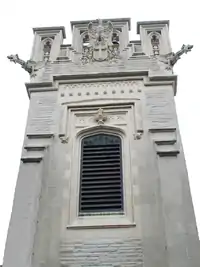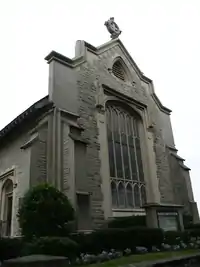Howard Nott Potter
Howard Nott Potter (May 6, 1859 – July 31, 1937), was an American architect known for his design of churches who was prominent in New York society during the Gilded Age.[1]
Howard Nott Potter | |
|---|---|
| Born | May 6, 1859 New York City, New York, U.S. |
| Died | July 31, 1937 (aged 78) |
| Alma mater | Union College Columbia College |
| Occupation | Architect |
| Spouse(s) | |
| Parent(s) | Clarkson Nott Potter Virginia Mitchell Potter |
| Relatives | Howard Potter (uncle) Robert B. Potter (uncle) Edward T. Potter (uncle) Henry C. Potter (uncle) William A. Potter (uncle) Alonzo Potter (grandfather) |
Early life


Potter was born in New York City on May 6, 1859. He was the son of Virginia (née Mitchell) Potter (1827–1890) and Democratic U.S. Representative Clarkson Nott Potter (1825–1882).[2] Among his siblings was Maria Louisa Potter,[3] who married Joseph Leslie Cotton of Boston;[4] Virginia Potter, who did not marry,[5] Eleanor Potter, [6] and Clarkson Alonzo Potter.[7] Upon his father's death in 1882, he shared in his estate valued in excess of $1,000,000.[6]
His paternal grandparents were Sarah (née Nott) Potter (daughter of Eliphalet Nott, the longest serving college president in the United States[8]) and Alonzo Potter, the Episcopalian Bishop of Pennsylvania. His maternal grandparents were Matthew and Louisa (née Kidd) Mitchell of Philadelphia.[8] Among his many prominent relatives were uncles Howard Potter, a New York City banker, Robert Brown Potter, a General in the American Civil War,[9] Edward Tuckerman Potter, an architect, Henry Codman Potter, the bishop of the Episcopal Diocese of New York, Eliphalet Nott Potter, who served as President of Union College and Hobart College, and William Appleton Potter, also an architect who designed the Church of the Presidents in Elberon, New Jersey.[10][11]
Potter was educated in private schools in New York, then "fitted for college" under Dean Oliver. He entered Union College and graduated in 1881 with an A.B. degree. After Union, he went abroad for several years until he returned in 1890 to attend Columbia College to study architecture. He returned to Europe to finish his education.[12]
Career
After completing his architectural education in Europe, Potter returned to New York and began his career by partnering with Glenville Snelling to form the architecture firm of Snelling & Potter.[12] In his practice, he was known for designing many private homes in the city and country, including the Bencoe Residence in White Plains, New York.[13] He also designed several churches, including the St. John's Cathedral in Jacksonville, Florida and the enlargement of The Priory in Pelham, New York.[1]
Potter also wrote about architecture, including Stable Planning, published in The Architectural Review in September 1902.[14] He served on the New York Society of Architects as the vice-chair of the Decoration committee in 1922.[15]
Society life
In 1892, Potter and his wife were included in Ward McAllister's "Four Hundred", purported to be an index of New York's best families, published in The New York Times.[16] Conveniently, 400 was the number of people that could fit into Mrs. Astor's ballroom.[17]
Potter was a member of the Kappa Alpha, the Racquet Club, the Westchester Country Club, and the City Club of New York.[12]
Personal life
On May 9, 1884, Potter was married to Ethelinda "Ethel" Potter (1860–1949).[18] Ethel, his first cousin, was the daughter of his paternal uncle, and fellow architect, Edward Tuckerman Potter, who designed the Nott Memorial at Union College.[19] Together, they were the parents of:[12]
- Howard Clarkson Potter (1894–1894), who died in infancy.[19]
- John Howard Nott Potter (1896–1961),[20] who married Margaretta Wood, daughter of Rear Adm. Spencer Shepard Wood.[21] He was president of Brett, Wyckoff, Potter, Hamilton Inc., real estate brokers in New York.[22]
- Ethel Julia Howard Potter (1898–1971),[23] who married artist Allyn Cox (1896–1982), son of artists Kenyon Cox and Louise King Cox, in 1927.[24]
Potter inherited fifty percent of his father's country house, known as "Nutwood", in New Rochelle, overlooking the Long Island Sound. They also had a home in Harrison, New York known as "Allendale Farm".[25]
Potter died at his home, "The Sea Horse" in Westhampton Beach, on July 31, 1937.[1] His widow died in Mendham, New Jersey in January 1949.[26]
References
- "HOWARD N. POTTER, ARCHITECT, IS DEAD; Retired Partner in New York Firm Built Many Homes and Churches Here RELATED TO TWO BISHOPS Great-Grandson of Dr.-Eliphalet Nott and. Son of President of Bar Association" (PDF). The New York Times. August 1, 1937. Retrieved 9 November 2018.
- "OBITUARY | CLARKSON N. POTTER" (PDF). The New York Times. January 24, 1882. Retrieved 9 November 2018.
- "Mrs. Joseph Leslie Cotton (ca. 1858-1882)". www.nyhistory.org. New-York Historical Society. Retrieved 9 November 2018.
- "WEDDINGS IN JUNE. COTTON-POTTER IN NEW-ROCHELLE" (PDF). The New York Times. June 8, 1881. Retrieved 9 November 2018.
- "VIRGINIA POTTER, 80; AIDED GIRLS CLUBS; Dies After Spending 60 Years Improving Living Conditions for Working Women" (PDF). The New York Times. October 28, 1937. Retrieved 9 November 2018.
- "Clarkson N. Potter's Will" (PDF). The New York Times. February 2, 1882. Retrieved 9 November 2018.
- "BEACH-AVENUE CLOSED TO TRAVEL" (PDF). The New York Times. June 3, 1883. Retrieved 9 November 2018.
- Smith, Henry Townsend (1913). Manual of Westchester County: Past and Present. H. T. Smith. pp. 64–65. Retrieved 9 November 2018.
- "CLARKSON N. POTTER'S SUMMER RESIDENCE" (PDF). The New York Times. March 7, 1882. Retrieved 9 November 2018.
-
 This article incorporates text from a publication now in the public domain: Chisholm, Hugh, ed. (1911). "Potter, Henry Codman". Encyclopædia Britannica (11th ed.). Cambridge University Press.
This article incorporates text from a publication now in the public domain: Chisholm, Hugh, ed. (1911). "Potter, Henry Codman". Encyclopædia Britannica (11th ed.). Cambridge University Press. - Kiger, Phebe Brooks (1976). The Genealogy and History of the Brooks and related families. Kiger. p. 36. Retrieved 9 November 2018.
- Raymond, Andrew Van Vranken (1907). Union University: Its History, Influence, Characteristics and Equipment, with the Lives and Works of Its Founders, Benefactors, Officers, Regents, Faculty, and the Achievements of Its Alumni. Union College, Albany Medical College, Albany Law School, Dudley Observatory, Albany College of Pharmacy. Lewis Publishing Company. pp. 24-25. Retrieved 9 November 2018.
- Architectural Record. McGraw-Hill. 1920. p. 107. Retrieved 9 November 2018.
- Quarterly Bulletin Containing an Index of Literature from the Publications of Architectural Societies and Periodicals on Architecture and Allied Subjects: V. 1-12, V. 13, No. 1-3; Jan. 1, 1900-Oct. 1, 1912. American Institute of Architects. 1902. p. 232. Retrieved 9 November 2018.
- New York Society of Architects (1922). Year Book of the New York Society of Architects. A. M. Madigan. p. 7. Retrieved 9 November 2018.
- McAllister, Ward (16 February 1892). "THE ONLY FOUR HUNDRED | WARD M'ALLISTER GIVES OUT THE OFFICIAL LIST. HERE ARE THE NAMES, DON'T YOU KNOW, ON THE AUTHORITY OF THEIR GREAT LEADER, YOU UNDER- STAND, AND THEREFORE GENUINE, YOU SEE" (PDF). The New York Times. Retrieved 26 March 2017.
- Keister, Lisa A. (2005). Getting Rich: America's New Rich and How They Got That Way. Cambridge University Press. p. 36. ISBN 9780521536677. Retrieved 20 October 2017.
- Landau, Sarah Bradford (1979). Edward T. and William A. Potter: American Victorian architects. Garland. pp. 81–82. ISBN 9780824039592. Retrieved 9 November 2018.
- Blatchford Memorial II: A Genealogical Record of the Family of Rev. Samuel Blatchford, D.D., with Some Mention of Allied Families, Also Autobiographical Sketch of Rev. Dr. Blatchford from "The Blatchford Memorial". Privately printed. 1912. pp. 87-88. Retrieved 9 November 2018.
- "JOHN H. N. POTTER, 64, EX-REALTY MAN HERE" (PDF). The New York Times. August 6, 1961. Retrieved 9 November 2018.
- The Hereditary Register of the United States of America. Hereditary Register Publications. 1976. p. 667. Retrieved 9 November 2018.
- "Miss Ferber Becomes Bride Of S.W. Potter". The New York Times. July 31, 1977. Retrieved 9 November 2018.
- "COX--Ethel H. Potter" (PDF). The New York Times. August 30, 1971. Retrieved 9 November 2018.
- Waggoner, Walter H. (September 28, 1982). "ALLYN COX, 86, PAINTER OF MURALS FOR U.S. CAPITOL". The New York Times. Retrieved 9 November 2018.
- Social Register, Summer: Contains the Summer Addresses of Residents of New York, Washington, Philadelphia, Chicago, Boston and Baltimore. Social Register Association. 1904. p. 305. Retrieved 9 November 2018.
- "POTTER--Ethel" (PDF). The New York Times. January 22, 1949. Retrieved 9 November 2018.